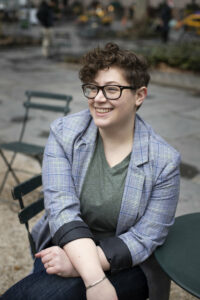In this lyrical and moving story of the world of Prolonged Grief, journalist Cody Delistraty reflects on his experience with loss and explores what modern science, history, and literature reveal about the nature of our relationship to grief and our changing attitudes toward its cure.
THE GRIEF CURE
by Cody Delistraty
HarperCollins, June 2024
(via Frances Goldin Literary Agency)
 When Cody Delistraty lost his mother to cancer in his early 20s, he found himself unsure how to move forward. Planning for her recovery, he and his family had a purpose. But after she was gone, there seemed to exist only the empty advice on grief: move through the five stages, achieve closure, get back to work, go back to normal. So begins a journey into the new frontiers of grief, where Delistraty seeks out the researchers, technologists, therapists, marketers, and communities around the world looking to cure the pain of loss in novel ways. From the neuroscience of memory deletion to book prescriptions, laughter therapy, psilocybin, and Breakup Bootcamp, what ultimately emerges is not so much a cure as a fresh understanding of what living with grief truly means.
When Cody Delistraty lost his mother to cancer in his early 20s, he found himself unsure how to move forward. Planning for her recovery, he and his family had a purpose. But after she was gone, there seemed to exist only the empty advice on grief: move through the five stages, achieve closure, get back to work, go back to normal. So begins a journey into the new frontiers of grief, where Delistraty seeks out the researchers, technologists, therapists, marketers, and communities around the world looking to cure the pain of loss in novel ways. From the neuroscience of memory deletion to book prescriptions, laughter therapy, psilocybin, and Breakup Bootcamp, what ultimately emerges is not so much a cure as a fresh understanding of what living with grief truly means.
As Delistraty followed the blueprint of his own ad hoc treatment plan, the question of whether the most painful kind of grief can and should be cured had also been taken up by the American Psychiatry Association, as they recently gave extended, intense, disruptive grief an official name: Prolonged Grief Disorder. Stamping this kind of grief with a diagnosis has opened innovative avenues of treatment and an important conversation about a debilitating form of grief, but it also raises the question of whether grief, no matter how severe, is best treated medically at all?
Rigorously researched and beautifully written, The Grief Cure is a moving and eye-opening chronicle of a new diagnosis and a wide-ranging cultural history of grief of all sorts as a human rite. Braiding deep, emotional resonance with sharp research and historical insight, Delistraty places his own experience in dialogue with great writers and thinkers throughout history who have puzzled over this eternal question: how might we best face loss?
Cody Delistraty is the culture editor at The Wall Street Journal Magazine. He has written essays and criticism for The New York Times, The New Yorker, The Atlantic and, while living in Paris for several years, he was the European arts columnist for The Paris Review. He has degrees in politics from New York University and history from the University of Oxford, where he graduated with a double distinction (first class). He and his work have been featured on WNYC, France 5 and Arté; British Vogue named him a best young writer of the year; and he has given corporate talks about tragedy, art, and creativity to companies like PwC.


 When Courtney Gustafson moved into a new rental in the Poets Square neighborhood in Tuscon, Arizona, she would never have guessed that a colony of feral cats living in her driveway would change her life forever. Settling into a secure romantic relationship while it felt like the world around her was burning down, she couldn’t know how reluctantly, then profoundly, she would come to care about the health and safety of those thirty-some-odd neglected cats: Beebs, Lola, Sadboy, Goldie, Dr. Big Butt, Reverse Monkey, Rihanna, and so many more.
When Courtney Gustafson moved into a new rental in the Poets Square neighborhood in Tuscon, Arizona, she would never have guessed that a colony of feral cats living in her driveway would change her life forever. Settling into a secure romantic relationship while it felt like the world around her was burning down, she couldn’t know how reluctantly, then profoundly, she would come to care about the health and safety of those thirty-some-odd neglected cats: Beebs, Lola, Sadboy, Goldie, Dr. Big Butt, Reverse Monkey, Rihanna, and so many more. In the English countryside—decimated by heat and drought—Penelope archives what remains of an estate’s once notable art collection. The crumbling country house has been her home for two decades and a refuge for those who have been displaced by disasters, but it is scheduled for demolition in a few months’ time. With this pressing deadline comes the impending return of Aidan’s brother, Julian, at whose hands Penelope suffered during a brief but violent relationship twenty-two years before. As Julian’s visit looms, Penelope finds herself unable to suppress the past, and she clings to art as a means of understanding, of survival, and of reckoning.
In the English countryside—decimated by heat and drought—Penelope archives what remains of an estate’s once notable art collection. The crumbling country house has been her home for two decades and a refuge for those who have been displaced by disasters, but it is scheduled for demolition in a few months’ time. With this pressing deadline comes the impending return of Aidan’s brother, Julian, at whose hands Penelope suffered during a brief but violent relationship twenty-two years before. As Julian’s visit looms, Penelope finds herself unable to suppress the past, and she clings to art as a means of understanding, of survival, and of reckoning. Sarah’s story begins as she’s researching what she believes will be a book about her high school philosophy teacher, a charismatic instructor who taught her and her classmates to question everything—in the end, even the reality of historical atrocities. As she digs into the effects of his teachings, her life takes a turn into the fantastical when her wife, Marta, is notified that she’s been investigated for sexual misconduct at the university where they both teach.
Sarah’s story begins as she’s researching what she believes will be a book about her high school philosophy teacher, a charismatic instructor who taught her and her classmates to question everything—in the end, even the reality of historical atrocities. As she digs into the effects of his teachings, her life takes a turn into the fantastical when her wife, Marta, is notified that she’s been investigated for sexual misconduct at the university where they both teach.